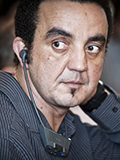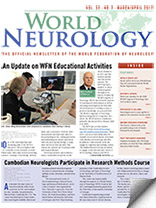Prof. G. Logroscino
University of Bari, Italy
Prof. P.M. Preux
University of Limoges, France
Prof. B. Marin
University of Limoges, France
Dr. F. Boumediene
University of Limoges, France

Pierre Marie Preux

Giancarlo Logroscino
An intensive five-day course on research methods, with a focus on practice in low- and medium-income countries, was presented Feb. 7-11 in Phnom Penh, Cambodia. The course was developed to help Cambodian neurologists establish clinical and population-based research programs on topics of utmost interest, including epilepsy, stroke, dementia, and infectious disease.
“The International Course of Neuroepidemiology, Clinical Neurology, and Research Methods in Low-Income Countries” was organized by Prof. Giancarlo Logroscino, from the University of Bari; Prof. Pierre Marie Preux, Dr. Farid Boumédiene, and Prof. Benoît Marin, all from the University of Limoges; and Prof. Chan Samleng, president of the Cambodian Society of Neurology and chair of Neurology at the University of Health Sciences of Phnom Penh.

Farid
Boumédiene

Benoît Marin
The course was made possible through the support of a World Federation of Neurology (WFN) Grant in Aid 2015, and supplemented by grants from the University of Bari and the University of Limoges.
Cambodia is experiencing a transition characterized by a rapid increase in life expectancy and of chronic diseases. In this context, neurology plays a major role within medicine but has to change perspective on education, clinics, and research.
The course was held at the University of Health Sciences of Phnom Penh. The faculty were Prof. Logroscino, Prof. Marin, and Dr. Boumediene. It was attended by 14 of 16 members of the Cambodian Neurological Society (eight neurologists out of nine). Also attending were 14 students of the School of Medicine, selected by the faculty.
The course faculty met with the dean of the University of the Health Sciences and the chair of medical affairs of the Calmette Hospital. Both praised WFN for its support and asked for the development of new courses on research and on new developments of specific sectors of clinical neurology.
The chair of medical affairs expressed interest in a course developed specifically for the heads of the clinical departments to provide basic epidemiologic skills through a short seminar series. The general director of the Calmette Hospital also announced his goal to create a clinical research unit.
The course was characterized by great enthusiasm and a high level of interaction between attendees and the faculty. Pre-course and post-course evaluations of the attendees’ skills in epidemiology were performed. Scores improved 4-10 points between the pre- and post-course evaluations.
A satisfaction survey was performed. Attendees reported:
- a high level of satisfaction
- an adequate course level
- a wish to progress to other courses at higher levels
- a longer period of teaching
The course concluded with a discussion between the faculty and the neurologists of the Cambodian Neurological Society. Because two programs on the epidemiology of epilepsy are being presented by the Cambodian Neurological Society and the University of Limoges, discussion was focused on other diseases, particularly research prospects in the fields of stroke and dementia.
An additional theme has been proposed for future courses: amyotrophic lateral sclerosis. This last area has been proposed because of the paucity of epidemiological and clinical data from Asian countries, with the exception of Japan.
Prof. Samleng called for the Cambodian Neurological Society to collaborate with the WFN in the future.
